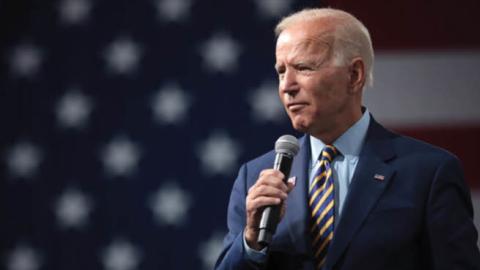Despite being frail and confused, he won the trust of an oligarchic party nomenklatura in a declining superpower by promising no structural reforms, no curbs on special interests and no changes to an interventionist, hegemonic and overextended foreign policy.
That’s a pretty neat summary of how the ailing Leonid Brezhnev held power in the USSR in the 1970s, or the ploy deployed by Konstantin Chernenko, the anybody-but-Gorbachev candidate, to become general secretary in 1984 before his death in office barely a year later. But the fact that it could also be read as an outline of Joe Biden’s pitch to the Democratic party establishment should give pause for thought.
Think of this comparison, in true eastern European style, as a “serious joke”. First, excuse the silly part: there are leagues of difference between the intrigues of a totalitarian party state and the Democratic primaries. There were obviously no free and fair elections in the USSR. But there is a core similarity. The late Soviet Union was a complex system that the party establishment knew by the late 1960s was badly malfunctioning. Yet rather than rethink their role in the world or embrace what were considered radical structural reforms that would have threatened the vested interests of party chiefs and state corporations, the Soviet establishment chose an avoidance strategy – first with Brezhnev, then with Chernenko. The price they eventually paid, with the USSR’s collapse, was world-historic.
This election cycle the Democratic party has been presented with not one but two compelling campaigns for structural reform in the shape of Elizabeth Warren ( who dropped out on Thursday) and Bernie Sanders. Both candidates have offered a sustained critique of the country’s economic model and argued that it is to blame for the rise of Donald Trump at home and has fuelled authoritarian kleptocracy abroad. Their campaigns consistently highlighted the unsustainable nature of the current trajectory when it comes to not just the financialisation of the US economy, but the failed approaches to healthcare, college debt, climate breakdown and defence. And, issue by issue , the progressive diagnoses and treatments for these ills have shown themselves to be highly popular.
Biden has effectively been the campaigner against structural reform: rather than articulating where he thinks the left flank’s analysis fails, he chooses to criticise their solutions as unworkable or unelectable. He was being honest when he told rich donors “nothing would fundamentally change” if he were elected president.
But there is more to this than merely waiving proposed wealth taxes. Unlike the Obama administration, his would be a government with no policy roadmap, no reformist agenda and likely no executive energy. Biden’s visibly frail mind would be in the driving seat and, with it, his nostalgia for days of civility and collaborative politics on Capitol Hill that have plainly failed the Democrats for decades. There would be no rethink of the US’s role in the world, despite the country having spent $5.9tn on conflicts in the Middle East and Asia that have not demonstrably made it safer.
Biden and his supporters’ desire to beat Donald Trump is laudable. He has clearly won the trust of African-American voters. But the fact that Biden has chosen to campaign for the presidency without presenting any goals beyond ejecting Trump should trouble us. By choosing to conceptualise Trump as an exception to the status quo and not as a product of the status quo, he fails to recognise that the conditions to produce another Trump still exist.
Much of what is now attracting the Washington establishment to Biden is that he offers an image that resembles the mythic form of American leadership. But it lacks substance. What concerns me is that those in the Beltway establishment most committed to the so-called “rules-based international order” that Trump has undermined are forgetting that American power is built on a foundation of widely shared domestic prosperity allowing social stability.
However when lower- and middle-class incomes have been stagnant for decades, nearly 140 million adults report “medical financial hardship” every year, life expectancy is in decline as personal, mortgage and college debt continues to rise, this foundation starts to crumble. Surveys show the national sense of wellbeing has declined. Key indicators like these were what the Soviet leadership chose to ignore when they decided they would rather retain Brezhnev in senility or choose Chernenko months away from death than confront the challenge of domestic reform.
This is where this “serious joke” gets really serious. Biden – if he survives the media- and Republican-led onslaught that will highlight every agonising mental blank as closely as Hillary Clinton’s emails – could actually win in November. Head to head polls in swing states show this electability. But those now rushing to endorse him have to be honest themselves about what kind of presidency this will be – a kind of caretaker government that will swear fealty to superpower myths, and ignore the immense structural problems hollowing out the nation’s strength from within because they are too hard.
Read in The Guardian




















